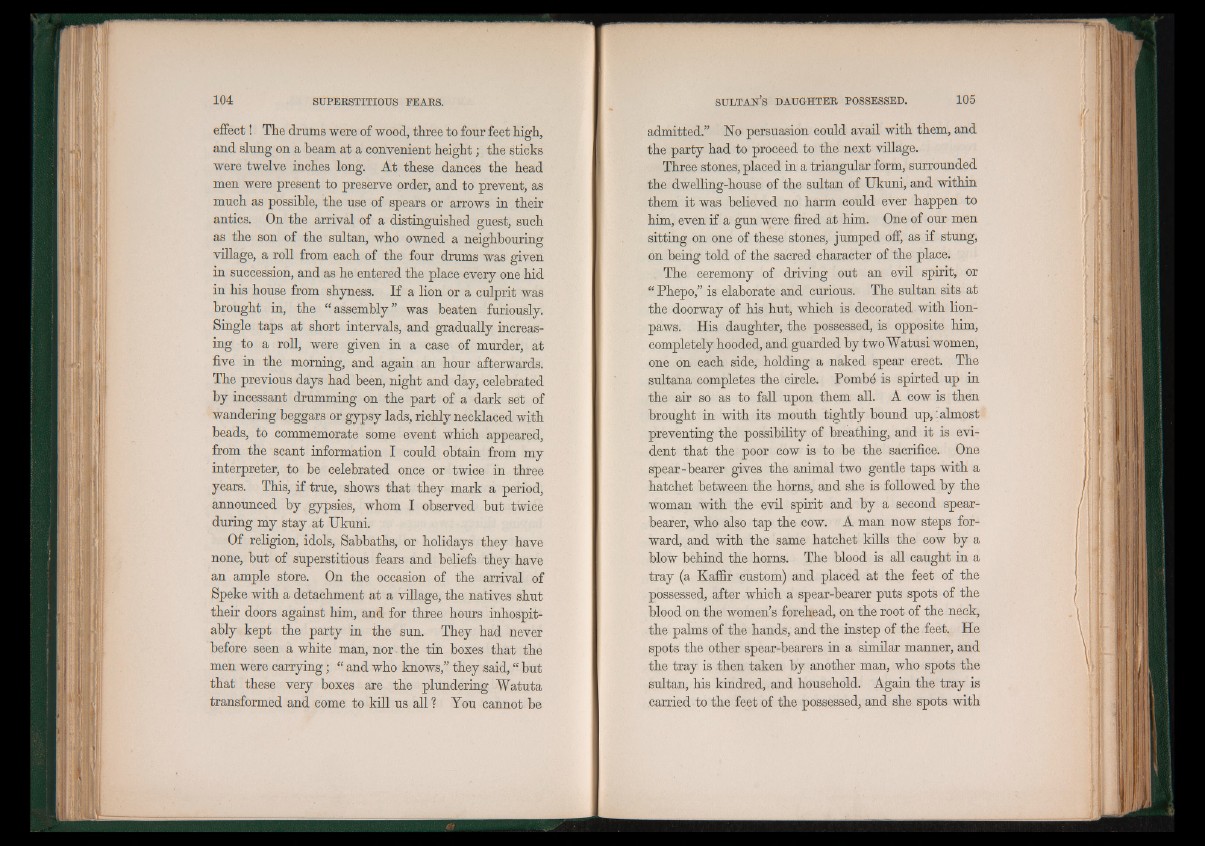
effect! The drums were of wood, three to four feet high,
and slung on a beam at a convenient height; the sticks
were twelve inches long. At these dances the head
men were present to preserve order, and to prevent, as
much as possible, the use of spears or arrows in their
antics. On the arrival of a distinguished guest, such
as the son of the sultan, who owned a neighbouring
village, a roll from each of the four drums was given
in succession, and as he entered the place every one hid
in his house from shyness. If a lion or a culprit was
brought in, the “ assembly” was beaten furiously.
Single taps at short intervals, and gradually increasing
to a roll, were given in a case of murder, at
five in the morning, and again an hour afterwards.
The previous days had been, night and day, celebrated
by incessant drumming on the part of a dark set of
wandering beggars or gypsy lads, richly necklaced with
beads, to commemorate some event which appeared,
from the scant information I could obtain from my
interpreter, to be celebrated once or twice in three
years. This, if true, shows that they mark a period,
announced by gypsies, whom I observed but twice
during my stay at Ukuni.
Of religion, idols, Sabbaths, or holidays they have
none, but of superstitious fears and beliefs they have
an ample store. On the occasion of the arrival of
Speke with a detachment at a village, the natives shut
their doors against him, and for three hours inhospitably
kept the party in the sun. They had never
before seen a white man, nor . the tin boxes that the
men were carrying; “ and who knows,” they said, “ but
that these very boxes are the plundering Watuta
transformed and come to kill us all ? You cannot be
admitted.” No persuasion could avail with them, and
the party had to proceed to the next village.
Three stones, placed in a triangular form, surrounded
the dwelling-house of the sultan of Ukuni, and within
them it was believed no harm could ever happen to
him, even if a gun were fired at him. One of our men
sitting on one of these stones, jumped off, as if stung,
on being told of the sacred character of the place.
The ceremony of driving out an evil spirit, or
“ Phepo,” is elaborate and curious. The sultan sits at
the doorway of his hut, which is decorated with lion-
paws. His daughter, the possessed, is opposite him,
completely hooded, and guarded by two Watusi women,
one on each side, holding a naked spear erect. The
sultana completes the circle. Pombe is spirted up in
the air so as to fall upon them all. A cow is then
brought in with its mouth tightly bound up, ^almost
preventing the possibility of breathing, and it is evident
that the poor cow is to be the sacrifice. One
spear-bearer gives the animal two gentle taps with a
hatchet between the horns, and she is followed by the
woman with the evil spirit and by a second spear-
bearer, who also tap the cow. A man now steps forward,
and with the same hatchet kills the cow by a
blow behind the horns. The blood is all caught in a
tray (a Kaffir custom) and placed at the feet of the
possessed, after which a spear-bearer puts spots of the
blood on the women’s forehead, on the root of the neck,
the palms of the hands, and the instep of the feet. He
spots the other spear-bearers in a similar manner, and
the tray is then taken by another man, who spots the
sultan, his kindred, and household. Again the tray is
carried to the feet of the possessed, and she spots with